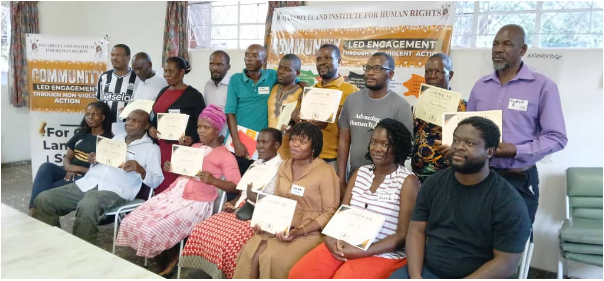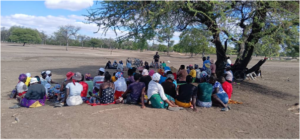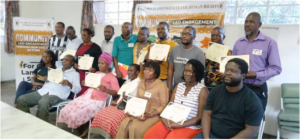
Zimbabwe ethnic minorities apply nonviolent techniques to claim their rights, starting with some ‘oil of confidence’ to lubricate their struggles
Zimbabwean community activists including many from ethnic and linguistic minorities, innovate their strategies by acquiring nonviolent methods to claim their rights, including as they resist injustice in development-induced displacements from their ancestral lands. The Matabeleland Institute for Human Rights is supporting them by offering capacity strengthening, and by mentoring and coaching them when they apply their skills in vulnerable rural communities.
Development-induced displacements are on the rise in Zimbabwe as the government is luring in the country foreign investors interested in mining and commercial agriculture. Currently, it is estimated that above 70,000 people in rural communities, many including ethnic and linguistic minorities, are facing displacements due to mining ventures, commercial agricultural projects, and dam construction initiatives. In the displacements processes, most communities are neither consulted nor fairly compensated for their many losses.
The training in nonviolent citizen engagement offered by the Matabeleland Institute for Human Rights (MIHR) in partnership with the International Center for Nonviolent Conflict offers the activists some practical knowledge and tools for nonviolent organizing, mobilizing and resisting injustices. After their initial training, the activists have been making strides in informing their communities about strategic nonviolence and how to practically apply the tools to defend their lands. Some have written petitions for specific changes in municipal By-laws or request the respect of the national Constitution regarding involuntary displacements. Others are using radio programmes in local languages to spread ideas about non-violent resistance to lang grabbing. Still others have used a variety of social gatherings, including funerals, to share information on displacements and on the related community rights.
MIHR has learned an important lesson: rather than focusing directly on ddisplacements, it is useful for the activists to focus first on some smaller local issues that are easier to win over; those smaller victories can provide the ‘oil of confidence’ to lubricate the long and difficult action needed to achieve success in larger struggles.





